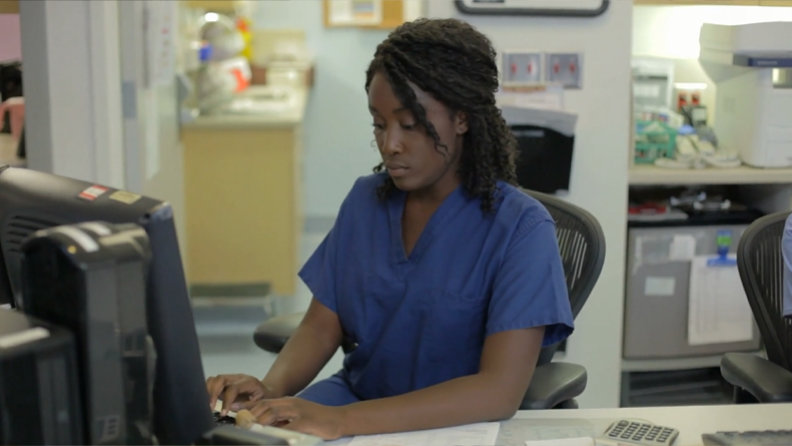Overview
The EKG & Phlebotomy Technician Combination Program at the Medical Training Institute of New York provides comprehensive training in blood collection and cardiovascular monitoring. This dual- focus program equips students with the skills to become proficient phlebotomists and electrocardiogram (EKG) technicians, preparing them for diverse roles in the medical field.
Key Training Areas:
- Phlebotomy Skills: Venipuncture, skin puncture, specimen collection, infection control, and quality assurance.
- EKG Skills: Basic EKG tracing, heart rate and rhythm analysis, identifying common cardiac abnormalities, and operating EKG machines.
- Foundational Knowledge: Anatomy of the venous and cardiovascular systems, medical terminology, and safety protocols.
Students receive hands-on training to perform vein and capillary punctures, glucose testing, and EKG procedures while mastering communication and professionalism. This combination program prepares students for careers in hospitals, diagnostic labs, and clinics, addressing both blood collection and cardiovascular diagnostics.
Career Outlook:
Phlebotomists and EKG technicians play essential roles in patient care, from drawing blood for testing and donations to performing EKGs for monitoring heart health. This dual certification broadens career opportunities, making graduates valuable in various healthcare settings.
Program Summary
Course overview
We are still updating our website with contents. Please check back next time.
Program Schedule
SPRING SCHEDULE*
Start Date: 3/12/2025
Expected Graduation Date: 5/21/2025
SUMMER SCHEDULE*
Start Date: 6/4/2025
Expected Graduation Date: 8/13/2025
*Orientation will be held approximately one week prior to the start of the program.
MTI Mission & Goals
The mission of MTI of New York is to offer education in Allied Health for on-demand occupations to members of our community in pursuit of advancing their career path in this employment sector. As such, MTI strives to deliver to its community of learners, opportunities for career advancement, change and expanding industry standards, the optimum delivery of services, which meet and exceed industry expectations, to place graduates at the top of the candidacy pool for positions within their area of choice.
Program Curriculum
| Course Code | Course Title | Hours |
|---|---|---|
| EPH101 | Fundamentals and Medical Terminology | 9 |
| EPH102 | Introduction to EKG | 3 |
| EPH103 | Anatomy & Physiology | 15 |
| EPH104 | Safety and Health | 10 |
| EPH105 | EKG Practice on Mannequin | 12 |
| EPH106 | EKG Live Practice | 15 |
| EPH107 | Infection Control and Universal Precautions | 3 |
| EPH108 | Blood Collections Equipment, Additives, and Order of Law | 9 |
| EPH109 | Venipuncture Procedures | 8 |
| EPH110 | Capillary Puncture Equipment and Procedures | 10 |
| EPH111 | Arterial Puncture Procedures | 8 |
| EPH107 | Infection Control and Universal Precautions | 3 |
| EPH112 | Non-Blood Specimens | 3 |
| EPH113 | Career Development Skills | 5 |
| EPH114 | EKG/Phlebotomy Technician Certification Exam Preparation | 10 |
| TOTAL PROGRAM HOURS | 120 | |
Grading Scale and Methods of Evaluation
| LETTER CODE | INCLUDED IN HOURS EARNED | INCLUDED IN HOURS ATTEMPTED | INCLUDED IN CGPA AND SAP | QUALITY POINTS |
|---|---|---|---|---|
| A = 90 - 100% | Yes | Yes | Yes | 4.00 |
| B = 80 - 89% | Yes | Yes | Yes | 3.00 |
| C = 70 - 79% | Yes | Yes | Yes | 2.00 |
| F = 0 - 69% | No | Yes | Yes | 1.00 |
| AU (audit) | No | No | No | n/a |
| I (incomplete) | No | Yes | No | n/a |
| P (pass) | Yes | Yes | No | n/a |
| PR (proficiency) | Yes | Yes | No | n/a |
| TC (transfer credit) | Yes | Yes | No | n/a |
| W (withdraw) | No | Yes | No | n/a |
| WP (LOA) | No | No | No | n/a |
| NP (not pass) | No | Yes | Yes | n/a |
Admission
GENERAL ADMISSIONS REQUIREMENTS
Prospective students are encouraged to apply for admission as early as possible to secure a place in their desired program and starting date. All applicants are required to complete a personal interview with an admissions representative, which is conducted in person. Guardians or significant others are encouraged to participate in the interview process. This interview helps the institution assess the applicant’s suitability for enrollment.
To complete the enrollment process, applicants must submit the following:
- Application for Admission Form
- Enrollment Agreement
- If under 18 years of age, the Enrollment Agreement must also be signed by a parent or guardian.
- Application Fee Payment
- This fee is non-refundable unless the applicant is denied admission or cancels the application within three days of the institution’s receipt of the application and fee.
- Student and Programmatic Disclosure Forms
- Entrance Exam (if applicable)
- Refer to “Selective Admissions Criteria” for details.
- Request for Official Transcripts
- Required if seeking transfer of previously earned college credit.
- Interview Acknowledgment Form/Student Information Record
The institution reserves the right to deny or rescind an applicant’s eligibility to begin classes if all general and selective admissions requirements are not successfully completed within the required timeframe.
Program-Specific Admission
Admission to one program does not guarantee eligibility for other programs. Applicants wishing to enroll in a different program in the future must independently meet all the requirements for that program at the time of application and undergo the selection process for that program.
Proof of Graduation
Documentation of high school graduation or its equivalent must be provided before the student’s first scheduled class. The student’s responsible for providing valid proof, and additional documentation may be required to verify authenticity. Failure to provide this documentation will result in enrollment cancellation, forfeiture of academic credits earned prior to cancellation
Prospective students must comply with the following admission requirements to enroll:
- Present a Valid picture ID
- Present one of the following:
- High School Diploma
- GED
- an associate or bachelor’s degree official transcript as proof of higher education completion.
- Students enrolling in a program including a clinical component are required to pass the Level 2 Criminal Background Check completed through an MTI of New York third-party.
- To qualify for enrollment, a one-on-one appointment with one of the school admissions’ representatives is needed. During the one-on-one appointment, the admission’s representative will provide advisement services to aid the student in planning and completing the program for enrollment.
- Diplomas and transcripts for education completed in a foreign country must be accompanied by the corresponding official translation and evaluation. For a listing of accepted translators and evaluators visit the National Association of Credential Evaluation Services (NACES) at www.naces.org Our school only accepts translations and evaluations received directly from NACES members, sent directly to our school, and addressed to MTI of New York, attention Admissions Department, 211 East 43rd Street, 2nd Floor, New York, NY 10117.
Selective Admissions Criteria
Some programs require additional testing or institution credit requirements. When the number of applicants exceeds available seats, a rubric is used to objectively assess and rank applicants. Factors considered include:
- Postsecondary coursework and grades (Math and Science focus)
- Entrance exam scores
- Prior graduation from an Allied Health program at another CEC institution
Applicants are ranked, and notifications of acceptance or alternate status will be issued. Alternates will be notified no later than the drop/add period of the class start date. Entrance exams may be waived for applicants holding an associate's degree or higher from an accredited institution.
Entrance Exam Re-Test Policy
Applicants who do not achieve the required score on an entrance exam may retest as follows:
- Second attempt: After a 24-hour waiting period.
- Third attempt: after a 48-hour waiting period.
- Fourth attempt: after a one-year waiting period.
Additional Program-Specific Requirements
- Diagnostic Medical Sonography (DMS) Program: Applicants are assessed using a standardized rubric that includes grades in Math and Science, Accuplacer Math scores, Wonderlic scores, and Program Director recommendations. Ranking determines final cohort acceptance.
Program Entrance Requirements
Students enrolling in the following programs must pass the Wonderlic Scholastic Level Exam (SLE) Entrance Test:
- Students enrolling in a hybrid program.
- Students enroll in an onsite (on campus) program for 300 hours or more.
The Wonderlic Scholastic Level Exam (SLE) minimum passing score is 13. The cost is $ 35 and paid by the student. Students can retake after a week, for a maximum of three (3) times.
| PROGRAM | WONDERLIC SCORE | ACCUPLACER SCORE (OVERALL/MATH) | ADDITIONAL REQUIREMENTS |
|---|---|---|---|
| Cardiovascular Sonography | 18 | 125/60 | Have a criminal background check |
| Diagnostic Medical Sonography | 18 | 130/65 | Have a criminal background check |
| Medical Assistant | 13 | N/A | None |
| Medical Billing | 13 | N/A | None |
| Pharmacy Technology | 13 | N/A | Have a criminal background check |
ASSOCIATE OR ADVANCED DEGREE ADMISSIONS REQUIREMENT
In addition to the general admission requirements, students wishing to enroll in the following programs are required to present an official transcript demonstrating the student has graduated from an Associate, Bachelor, or advanced Degree program from an accredited higher education institution recognized by the United States Federal Department of Education, or its equivalent as approved by an official evaluation and translation by a member of the National Association of Credential Evaluation Services (NACES) at www.naces.org:
- Surgical Technology Programs
- Radiography Technology Programs
- Radiation Therapy Programs
Official transcripts are to be sent directly from the issuing institution to MTI of New York, attention Admissions Department, 211 East 43rd Street, 2nd Floor, New York, NY 10117
You can still apply
Graduation Requirements
To qualify for graduation, students must maintain a minimum 2.0 (C) Grade Point Average and be current with their tuition payments. Students must also satisfy the requirements of any externship or internship in which they have participated.
- A minimum, cumulative GPA of 2.0.
- Complete all documents, files, and examinations, as necessary.
- Comply with all Medical Training Institute of New York regulations.
- Fulfill all financial obligations to MTI of New York.
- Successfully complete an externship as required.
- Return swipe card and ID card
Tuition, Books & Technology Fees
Total Program Cost:
| Program | EKG/Phlebotomy Technician |
| Hours | 120 |
| Application Fee: | $100 |
| Tuition: | $1,650 |
| Technology Fee: | $200 |
| Clinical & Lab Fee: | $350 |
| Book Fee: | $270 |
| Uniform Fee: | $66 |
| Total Cost: | $2,636 |
Tuition and Fees
Registration
A non-refundable Registration fee of $100 is due during registration to reserve a seat in the program.

Clinical/Lab
The Clinical/Lab fee is used to cover the cost of the Liability insurance policy, student lab equipment and supplies, and to provide students with Liability insurance during their clinical rotation internship.

Technology
The Technology Fee provides students with access to Online Learning Resources, the learning management system (“LMS”), and the student portal.

Books
Required books for the specific module of the program a student is entering can be requested from the school bookstore or online at portal.mtiofnewyork.com/stores prior to the start of each quarter.

Uniform
Students can request one (1) set of MTI logo scrubs from the school bookstore or online at portal.mtiofnewyork.com/stores prior to the start of the program. Additional uniforms may be purchased from the school bookstore or online at portal.mtiofnewyork.com/stores.

Tuition
The total cost for the EKG/Phlebotomy Technician program is $2,636, which includes $1,650 in tuition and $986 in additional fees. Payments are due before the start of Quarter 1 and are divided into refundable and non-refundable portions, as outlined below.

| Refundable | Non-Refundable | ||||||
|---|---|---|---|---|---|---|---|
| Prior to Quarter 1 | Total | Tuition | Technology | Clinical & Lab | Registration | Books | Uniform |
| $2,636 | $1,650 | $200 | $350 | $100 | $270 | $66 | |
Confirmation of Fee Terms:
- Tuition refunds will be processed in accordance with the program’s refund calculation policy as governed by New York State.
- Technology and Clinical/Lab fees are refundable only if a refund request is made before the start of a quarter.
- Book and Uniform fees must be paid prior to Quarter 1 and are non-refundable.
Paying For Your Program
PAYMENTS
Method Of PaymentThe Student Accounts Office offers a veriety of payment options, including online payments, credit cards, checks, wire transfer, Western Union, Paypal, and cash; both Monthly/Bi-Weekly/Weekly Paymeny plans and as a lump sum. Students who desite greater flexibility
In all cases, Program Tuition and Fees must be paid in full (in US Dollars) before your course’s enrollment deadline based on the table in the Tuition section above.
- Payment Options
- Payment Plans may be available to students
The Payment Plan allows you to pay quarter Tuition and fees over four installments per quarter. A suggested initial down payment of $1,650 of the total tuition cost is required for all quarter programs, after which the remainder of the tuition is divided into five installments per quarter.
To enroll in the Payment Plan, please email StudentBilling@mtiofnewyork.com. Be sure that “Payment Plan” appears in your message’s subject line. Visit our website www.mtiofnewyork.com for a more detailed explanation.
Private Education LoansStudents may elect to apply for a loan and choose to pursue loans to cover the cost of their education or any part of it, over a Term or a Quarter. You can take out loans to cover the entire cost of the Program, or just a part of the cost, as a supplement to your Monthly/Bi-weekly/weekly income. For more information, visit our website
https://www.mtiofnewyork.com/medical-training-institute-student-financial-services/Students must provide a signed promissory note from the issuing body. This agreement will become effective when the signed promissory note is provided to the school
Refund Policy
A student who cancels within 7 days of signing the enrollment agreement receives all monies returned, with the exception of the non-refundable registration fee.
Thereafter, a student will be liable for
- The non-refundable registration fee plus
- The cost of any textbook or supplies accepted, plus
- Tuition liability as of the student’s last date of physical attendance.
Tuition liability is divided by the number of quarterly in the program. Total tuition liability is limited to the quarter during which the student withdrew or was terminated, and any previous quarter completed.
Termination
During the first quarter of the program:
If termination occurs Student Refund School may keep Student Refund Prior to or during the first week 0% 100% During the second week 25% 75% During the third week 50% 50% During the fourth week 75% 25% After the fourth week 100% 0% During the second and remaining quarters of the program:
If termination occurs Student Refund School may keep Student Refund Prior to or during the first week 25% 75% During the second week 50% 50% During the third week 75% 25% During the fourth week 100% 0% -
The student refund may be more than that stated above if the accrediting agency refund policy results in a greater refund.
Refunds are calculated based on the student’s last day of physical attendance and the total quarter’s tuition due, not the total tuition paid by the student up to that point. If a student withdraws during the second term/quarter, the student must use the “First Term/Quarter” schedule unless the school can demonstrate that no significant educational change has occurred in the program as of the student’s last date of attendance. Significant educational change is defined as non-functioning educational equipment which adversely affects a student’s educational program, a material change in the student’s schedule as agreed to at the time of the student’s enrollment, substitution of a teacher in a course after instruction has begun where such teacher does not possess the necessary language skills in the approved language of instruction in order to effectively communicate the subject matter to the students, or a significant increase in the student to teacher ratio. If no significant educational change has occurred at the beginning of the second term/quarter, the refund policy for subsequent terms/quarters applies. The student refund may be more than that stated above if the accrediting agency refund policy results in a greater refund.
Instructor
We are still updating our website with contents. Please check back next time.
WHAT YOU'LL LEARN

- Medical Terminology
- Introduction to EKG
- Anatomy & Physiology
- Safety and Health
- EKG Practice on Mannequin
- EKG Live Practice
- Past and Present and the Healthcare Setting Quality Assurance and Legal Issues
- Human Anatomy and Physiology: The Circulatory System
- Infection Control, & Universal Precautions Safety, First Aid, and Personal Wellness
- Blood Collection Equipment, Additives, and Order of Draw Live Practice: Venipuncture Procedures: Practice on Mannequin
- Pre-analytical Considerations
- Capillary Puncture Equipment and Procedures Special Collections and Point-of-Care Testing: Practice on Mannequin & Live Practice
- Arterial Puncture Procedures: Practice on Mannequin
- Non-blood Specimens and Tests, Computers and Specimen Handling and Processing, Topics in Phlebotomy
- Career Development Skills and Management Skills
- Phlebotomy and EKG Technician NHA Certification Exam Preparation
WHO WILL BENEFIT

Those Considering Nursing
If your goal is to become a nurse, starting out as an EKG/Phlebotomist is a great opportunity to explore the nursing field. You'll get the chance to work alongside LPNs and RNs in a variety of healthcare settings, earning invaluable experience and skills along the way

Aspiring Medical Professionals
Working as an EKG/Phlebotomist gives many of us our first taste of working in the medical field. You might gain inspiration to continue that career path and get a more in-depth understanding of the medical world. It's okay to share this desire with your interviewer. It shows your dedication to the field and a willingness to learn

Job Stability
The employment of phlebotomists is projected to grow 22% from 2020 to 2030, with about 19,500 job openings annually, driven by the demand for bloodwork in hospitals, labs, and donation centers. Blood analysis remains a vital function in medical diagnostics, keeping demand for skilled phlebotomists high.
Similarly, EKG technicians are essential as cardiovascular conditions are a leading cause of health issues, driving the need for heart monitoring. These technicians play a critical role in performing and interpreting EKGs for diagnosing and managing heart diseases. Together, these dual-trained professionals are highly valued in healthcare, offering strong job stability and versatility in medical settings.
Spring 2025
April 29, 2025
Total hours: 80
Day, Evening, Weekend Options
Weekdays: 10 Weeks Weekends: 10 Weeks
Weekdays: 12 hours Weekends: 12 hours
Tuition Cost: $1,650
Total Program Cost: $2,636
Apply NowSummer 2025
June 4, 2025
Total hours: 80
Day, Evening, Weekend Options
Weekdays: 10 Weeks Weekends: 10 Weeks
Weekdays: 12 hours Weekends: 12 hours
Tuition Cost: $1,650
Total Program Cost: $2,636
Apply NowSchedule of Sessions Options
9:00 AM - 1:00 PM
Morning Schedule
The day program is 10 weeks long. Students attend classes 12 hours a week attending classes Monday through Wednesday.



